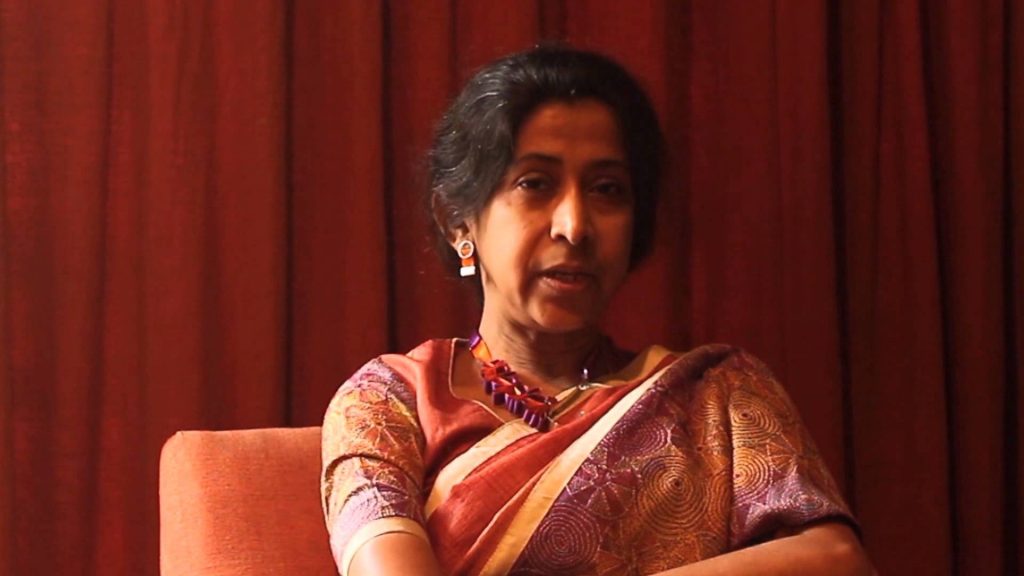GOA UNIVERSITY
Visiting Research Professors Programme
D D Kosambi Chair in Interdisciplinary Studies
and
Department of History, Goa University
A Course on
HSO-158 Nation, Gender and Politics in India
Credit: 01 Credit (15 contact hours; 25 marks)
From 28th November to 7th December, 2017
Venue: Seminar Hall, Social Sciences Block
By

Prof. Ishita Banerjee-Dube,
D.D. Kosambi Chair Professor, Goa University
(Research Professor in History, Centre for Asian and African Studies, El Colegio de México)
Objectives: Drawing upon and extending D.D. Kosambi’s suggestive call to read history in terms of socio-economic formations instead of a mere chronological sequence of episodes, this course will bring important studies on nation and nationalism in a dialogue with radical insights provided by gender and feminist studies. Beginning with a close analysis of some well-known works on nationalism, it will explore the crucial and critical impulse offered by the perspective of gender that does not only add new dimensions to the understanding of nation and nationalism, but also push for a thorough reconsideration of the cultural and material discourse of nationalism. The primary focus of the course will be on India: from the construction of the ‘new woman’ by the nationalist discourse in the late 19th century through the mapping of the nation as mother in the early 20th century and the distinct apprehensions of the nationalist struggle and Gandhi’s message by women, to the varied interface of gender, nation, politics and citizenship in contemporary India. At the same time, it hopes to be able to encourage students to reflect on the relation of gender and nation and their mutual imbrication in different parts of the globe.
Schedule *** REVISED
(Lecture timings 2.30 pm to 5.00 pm)
- Tuesday, 28 November- Introduction: Nation, Nationalism and Gender
- Thursday, 30 November – Nation’s women: From Sati to Lakshmi and Annapurna
- Friday, 01 December- Mapping Mother India
- Tuesday, 05 December- Weaving the Nation: Charkha, Khadi, Women
- Wednesday, 06 December- Women and Nation Today: Bharat Mata in Pitribhumi
- Thursday, 07 December: sessions continued
- Friday, 08 December: 10.00-11.00 (Exam for students registered for credits. Venue will be announced)
Evaluation: Continuous evaluation: 10 marks (home assignment: short paper on assigned themes), and written exam (15 marks) at the end of the course.
The course is open to PG students and Research Scholars of Goa University. Members of the general public are welcome to attend.
CLICK HERE TO REGISTER FOR COURSE
Course Coordinator-: Prof Nagendra Rao, Dept of History.
Suggested Readings:
- Anderson, Benedict. Imagined Communities: Reflections on the Origin and Spread of Nationalism, London: Verso, 1993.
- Chatterjee, Partha. The Nation and its Fragments: Colonial and Postcolonial Histories, New Delhi: Oxford University Press, 1994.
- Yuval-Davis, Nira, Gender and Nation, London: Sage Publications, 1997.
- Scott, Joan W. “Gender: A Useful category of Historical Analysis”, The American Historical Review, vol. 91, issue 5 (1986), pp. 1053-1075.
- Sangari, Kumkum & Sudesh Vaid (eds.), Recasting Women: Essays in Indian Colonial History, New Delhi: Kali for Women, 1989, Introduction.
- Ramaswamy, Sumathi. The Goddess and the Nation: Mapping Mother India, Durham & London, Duke University Press, 2010.
- ––––––––––––. “Maps and Mother Goddesses in India, Iago Mundi, vol. 53 (2009), pp. 97-114.
- Banerjee-Dube, Ishita. A History of Modern India, New Delhi, Cambridge University Press, 2015.
- Sinha, Mrinalini, “Historically Speaking: Gender and Citizenship in Colonial India,” In Judith Butler & Elizabeth Weeden eds. In Terms of Gender: Joan Scott’s Critical Feminism (Bloomington: Indiana University Press, 2011), pp. 80-101.
- Amrita Basu, “Women and Religious Nationalism In India: An Introduction”, and “Feminism Inverted: The Real Women and Gendered Imagery of Hindu Nationalism”, Bulletin of Concerned Asian Scholars, vol. 25, no. 4 (October-December 1993), pp. 3-4; 25-37.
- Bacchetta, Paola, “All our Goddesses are Armed: Religion, Resistance and Revenge in the Life of a Hindu Nationalist Woman”, Bulletin of Concerned Asian Scholars, vol. 25, no. 4 (1993), pp. 38-52.
Ramrao Wagh, Professor Pratima Kamat,
VRPP Coordinator Head, Dept of History
For course details and ONLINE REGISTRATION: www.unigoa.ac.in/vrpp
Email : [email protected]